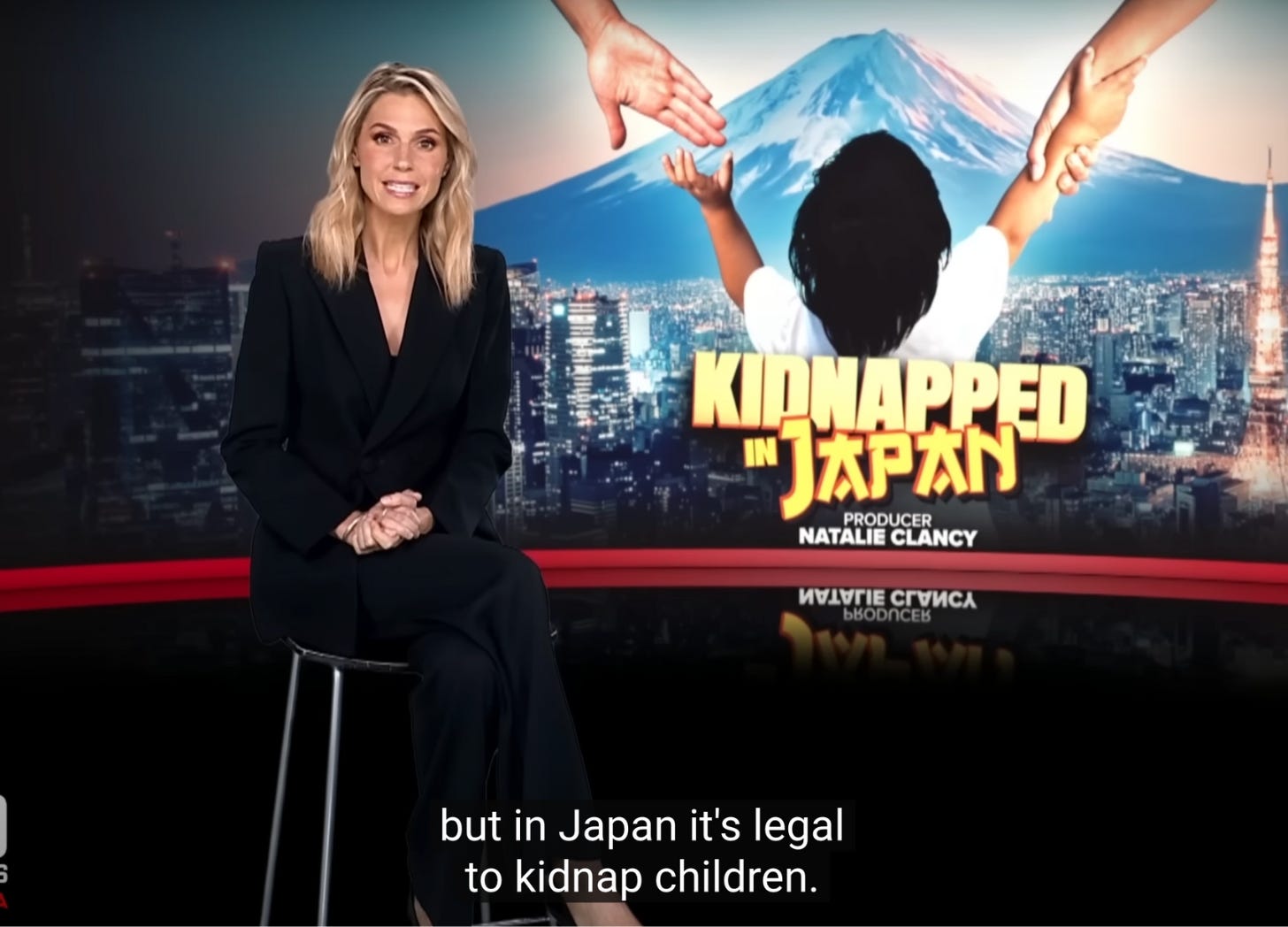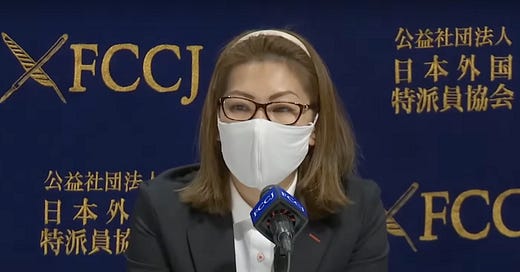Fathers' Rights Propaganda in Japan
Mandatory, non-consensual joint “parental authority” legislation and propaganda led by the fathers’ rights movement in Japan
This guest post is written by Lisa Ogawa of Hague Mothers Japan. It is the first in a series exposing how western countries are using propaganda and diplomatic carrots and sticks to impose the disastrous western “family court” model on the rest of the world.
In March 2023, Australia ‘urged’ the Japanese government to change our ‘sole custody law’ and to establish joint parenting arrangements.
The Australian government’s response was based on misinformation fabricated by activists from the Japanese fathers’ rights movement, which was expounded in a recent episode of 60 Minutes Australia.

They accuse Japan of having a sole custody law: in fact Japan has no such law. Article 766 of our Civil Code states that ‘custody must be decided by agreement or judgment,’ which allows for co-parenting if there is a minimum level of trust between the parents. There are many parents who co-parent post-divorce. The difference lies in whether the court mandates ex-partners whose relationship has broken up to the extent that they cannot cooperate1.
The substantial number of inaccuracies within the program are delineated in this document that Safe Parents Japan, a group of DV/child abuse survivors, has sent to the Ministry of Foreign Affairs of Japan. Similarly, in July 2020, the EU Parliament sounded “alarm over children in Japan taken from EU parents” based on petitions they received from EU citizens who struggle to see their children in Japan.
Lost in translation: The Non-existent "Sole Custody" Law in Japan
The mistranslation of terminologies related to child custody has been exploited to advocate for the ongoing legislation of “Joint Parental Authority.” In Japan, legal professionals use three terms when discussing child custody matters: shinken, kango, and fuyo-gimu:
Shinken (“parental authority”): Shinken encompasses a wide range of responsibilities, including parental rights and duties regarding child care, legal representation, and the right to determine the child's residence.
Kango (“custody”): This refers to the right and responsibility to care for the child, which includes visitation rights and the obligation to provide financial support.
Fuyo-gimu (“parental duty”): This entails the parental responsibility to support a minor economically. Every parent, regardless of marital status, has this duty."
However, these concepts, especially the first two, have often been confused, even in significant meetings such as the UN Committee on the Rights of the Child2. Under current law, parents or the court must determine which parent will have "parental authority" after a divorce, while the non-resident's visitation rights are protected unless there is clear evidence of child abuse.
Ongoing Debate over the Introduction of Mandatory, Non-Consensual Joint Parental Authority (Kyodo-Shinken)
Currently, the Japanese government is in discussion over revising the Civil Code, with a particular focus on changing the sole parental authority system to enable a mandatory, non-consensual joint parental authority system. We are campaigning to halt this change.
Why? While joint parental authority may seem reasonable in theory, in practice, it will further jeopardize the safety and well-being of mothers and children in Japan who are victims of domestic abuse or coercive control.
The situation of women in Japan is already problematic in this regard.
Japan ranks 125th out of 146 countries in the gender equality index. It’s undoubtedly a male-dominated society, where the vast majority of women are responsible for 80% of housework and 70% of childcare3.
Little public support to protect victims of DA in spite of the fact that this is a serious problem in Japan. In 2020 alone, 190,000 cases of domestic abuse were reported4, women are subjected to life-threatening violence, including murder and attempted murder, at a rate of one person every four days5. Additionally, 26% of reported abusive parents also abuse their children6. Occupation order does not exist and getting restraining orders is nearly impossible. Therefore, fleeing with their children is often the only option available to mothers in an abusive environment.
Japan's divorce system poses challenges. If either party refuses to divorce, a lengthy court battle ensues. This process can take years, with children's safety and well-being being the primary reason for divorce. Many mothers seek divorce to protect their children from family violence7.
70% of non-resident parents, mostly fathers, fail to pay child support. This situation contributes to the dire financial situation of half of single mothers who live below the poverty line.
Family courts sometimes order visitation with abusive parents, even when children refuse, are ill, or suffer from PTSD due to the abuse. With minimal public support for visitation arrangements, domestic abuse victims are forced to continue contact with their abusive ex-partners.
The introduction of joint parental authority in this already problematic situation would only serve to benefit abusive fathers seeking to maintain control over their ex-partners and children. The fathers' rights movement in Japan is leveraging the intervention of Australia, the EU Parliament, and the UN to exert pressure on the Japanese government to enact a law that would compel victims of domestic abuse to share parental authority with their abusers. Such legislation would further hinder women and children from escaping the perpetrator's control.
The propaganda battle
The fathers' rights movement was imported to Japan from Europe in the late 2000s. A major element of their campaign is to use western media to exert social pressure on Japan by exploiting prevailing misunderstandings about Japanese family law and ignoring our social conditions.
Fichot's story is a case in point. Vincent Fichot, a Frenchman living in Japan, went on hunger strike during the Tokyo Olympics, claiming that his wife had kidnapped his children. He even called in French Prime Minister Macron and got France to issue an arrest warrant for his wife. Politicians, activists and lawyers in Japan and other countries joined his campaign and used his case to push Japan to change its family law.
A few years later, his wife, Madame Fichot, spoke out. She held a press conference in front of international media because she decided to sue the media and groups for spreading false information about her and invading her privacy. At the press conference, she explained that much of what her husband had said wasn't true. She didn't kidnap her children. She only left the house with her children because he told her that he hired a divorce lawyer and also asked her to give him their children’s passports to take them to France, where they have never lived. Naturally, she became scared that he would take the children to France. He was even found applying for the children’s passports, which was rightfully rejected by the authority. (All this information was recognized as facts at the family court).
The hunger strike, posting photos of his wife and children online, using a video that the wife is carrying an empty child car seat into the trunk as an accusation of child abuse (he posted that she is carrying the child to the trunk to run away), and his attempt to get his wife arrested as a kidnapper, are a continuation of that control. Fichot has repeatedly claimed in public that he ‘cannot see his children’ yet has never requested visitation in a Japanese Court.
While the fact that a woman's life was destroyed by fake news spread by the alleged abuser is distressing in itself, the press conference was even more distressing. Madame Fichot was constantly harassed and interrupted by journalists at the conference - to the extent that the host had to intervene several times to ask them to behave respectfully. And her evidence was reported only once in western media - with a negative slant - while her husband’s story gained considerable positive exposure. It appears that western media is only interested in the father's point of view.
The pressure on Japan to introduce joint parental authority is not only coming from western media and governments. Supported by the fathers' rights movement, some Japanese MPs are actively working to introduce this legislation with a campaign of misinformation and disinformation.
We need to prevent this change and safeguard victims and survivors of domestic abuse and coercive control.
Our petition to halt the dangerous legislation is gaining momentum
The "#STOPJointParentalAuthority - A divorce-ban law in practice" petition garnered over 50,000 supporters in just 12 days."The court workers' union raised concerns about lacking resources (including professionals and infrastructure) to handle the estimated increase in disputes8. 80% of lawyers responded that they are either "opposed" or "somewhat opposed" to the legislation9.
A group of MPs, led by MP Tetsuro Fukuyama and Seiko Noda, recently held a meeting expressing concerns about the legislation.
Change is beginning to occur.
Please assist us by:
Signing this Change.org petition and leaving a comment.
Sending emails to these Japanese MPs driven by FRMs to cease endangering children and domestic abuse victims. These MPs have been ignoring voices raising alarm about the life-threatening danger faced by victims of domestic abuse and advocating for the dangerous legislative change:
Masahiko Shibayama: info@shibamasa.net
Hidehiro Mitani: info@mitani-h.net
Hideki Makihara: office@hmacky.net
Mizuho Umemura: info@umemura-mizuho.com
Yukiko Kada: Unfortunately, there is no official email available for her, but she deserves to be on this list. She exposed the location of a DV shelter as she laughed.
Share this blog post with these hashtags: #SharedCustodyByChoice and/or #ChoiceNotCourt
Thank you!
Family Court Crisis abhors the use of public money to further western ideological and private financial interests in this untransparent and undemocratic way. The US “family court” business model has had disastrous impacts on child safety and welfare in western countries, which must immediately abolish it, compensate victims of miscarriage of justice and criminally sanction individuals involved in wrongdoing. Taxpayers’ money must not be used to further the interests of violent men (or women), or predatory “family court” practitioners overseas.
Ogawa, T. (2023). Law system and practice in Japan, UK, US, Australia. In T. Kumagami & H. Okamura (Eds.), Visitation and joint parental authority (pp. 50–57). Akashi Shoten.
Coalition of Citizens Against Joint Parental Authority (離婚後共同親権に反対する市民の会) (2021, March). Retrieved February 12, 2024, from https://stop-kyodoshinken.studio.site/UN. This website explains line-by-line how the simultaneous interpretator at the UN Committee on the Rights of the Child mistakenly translated the term “custody” and “parental authority.”
National Institute of Population and Social Security Research. <https://media.shaho.co.jp/n/nd5b22c776ba0>
Gender Equality Bureau Cabinet Office, Japanese government. <https://www.mhlw.go.jp/content/11900000/000884946.pdf>
Gender Equality Bureau Cabinet Office, Japanese government. Figures calculated based on statistics by the Metropolitan Police Department of Japan in 2020. <https://www.gender.go.jp/about_danjo/whitepaper/r03/zentai/html/zuhyo/zuhyo01-07-02.html>
Gender Equality Bureau Cabinet Office, Japanese government. Number of Reported Case to Spousal Violence Counseling and Support Center. <https://www.gender.go.jp/policy/no_violence/e-vaw/data/pdf/2021soudan.pdf>
Single Mother Support National Network (Coalition of 31 organizations), presented at the Subcommittee of the Legislative Council, Ministry of Justice, Japanese government. Can Joint Parental Authority protect Children’s Safety and Security. <https://www.moj.go.jp/content/001378053.pdf>
Zen Shiho Rodo Kumiai (All Court Employee Union). <http://www.zenshiho.net/shinbun/2024/2416.html>
"Concerns Raised Over Civil Code Amendment Draft Enabling "Joint Custody" After Divorce - Lawyer Survey" (離婚後の「共同親権」を可能にする民法改正要綱案に懸念の声〈弁護士アンケート〉). (2024, February 10). Bengo4.com, Inc. <https://www.bengo4.com/c_3/n_17170>







